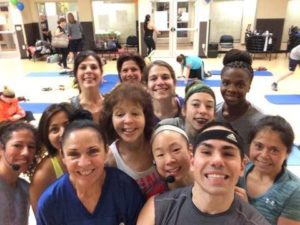by Michelle Sutton-Kerchner
Challenge yourself and discover your full ability to achieve …
It’s a time of year when competition pops up everywhere, from a backyard game of volleyball to official cycling and running events. The Center joins in with its annual Dog Days of Summer Challenge. What makes competition, in any setting, helpful at reaching fitness goals? The right mix of motivating factors.
Excitement
We live by a pattern of regularity. We do things the same, comfortable way and are generally happy when we receive the same, expected results. Predictable is easy. We can proceed without questioning. We run a certain amount of miles, take a specific fitness class, and lift a standard amount of weight during a workout. Maintaining the status quo can be the Grim Reaper of success. Without challenges, the body and mind become stagnant.
Competition encourages us to venture into the unknown. Every event is a chance for self-discovery as we learn how to physically and mentally tackle obstacles and go farther. Often, variety is involved. It isn’t every day that you run a marathon or launch ahead with a new fitness class.
Support
 Even though you may embark upon battle with your opponents, you are still involved in a social engagement. Perhaps you are part of a team. If going it alone, as with self-competition, you have friends and family to cheer you on. Opportunity for comradery surrounds you and motivates you toward success.
Even though you may embark upon battle with your opponents, you are still involved in a social engagement. Perhaps you are part of a team. If going it alone, as with self-competition, you have friends and family to cheer you on. Opportunity for comradery surrounds you and motivates you toward success.
Tracking
 Training for competitive fitness events requires a solid fitness plan, with goal monitoring throughout. An outline of specific steps helps clearly define which fitness goals you want to accomplish, along with a deadline for achieving them. Tracking motivates progress by showing improvements, whether it be an increase in treadmill time or an improvement in swim strokes.
Training for competitive fitness events requires a solid fitness plan, with goal monitoring throughout. An outline of specific steps helps clearly define which fitness goals you want to accomplish, along with a deadline for achieving them. Tracking motivates progress by showing improvements, whether it be an increase in treadmill time or an improvement in swim strokes.
Your quarterly nurse evaluations and personal training assessments act similarly as tracking tools. They indicate, in writing, how far you’ve advanced with your workout both inside–with blood pressure readings, heart rate monitoring, and BMI recordings—and outside with increased fitness capabilities (and, yes, those waist measurements).
Self-confidence

Getting involved in a competition, whether formally or just for fun, can be a challenge in itself. It requires you to step out of your comfort zone and put your skills to the test, often publicly. By nature, a competition usually involves other people. If you typically work out alone, this group environment itself can seem a bit overwhelming. However, once registered, the journey begins.
Quickly, you realize what needs to be done and the action needed to achieve it. With every step, pedal, stroke, or rep, you grow stronger and closer to becoming your own personal best. You break boundaries and recognize your true potential, not the self-imposed, time-constrained one of your every day life. This realization is perhaps the biggest win of every competition.
 Fitness & Wellness News Your Source for Fitness News, Wellness News, Health News, and Nutrition News!
Fitness & Wellness News Your Source for Fitness News, Wellness News, Health News, and Nutrition News!




